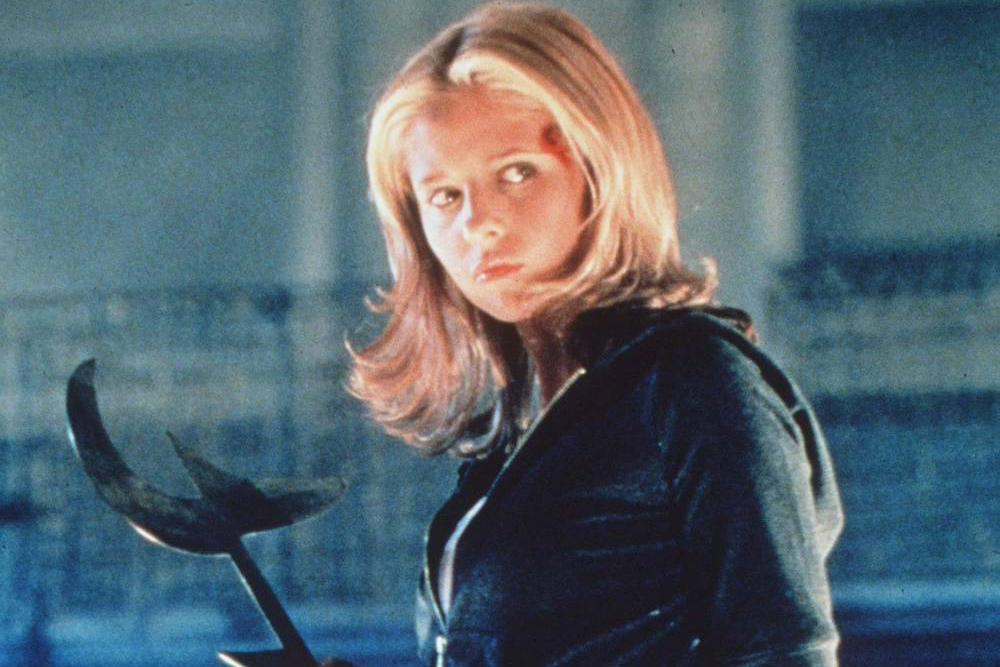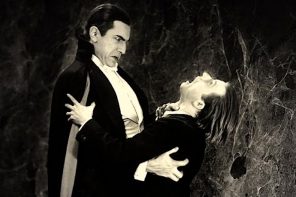Buffy the Vampire Slayer. To the uninitiated, it sounds like a bad joke. That’s your favorite show? Really? Aren’t you a professor… and an adult… and a Man? But to the initiated… well, to the initiated it is also a joke, and these reactionary reactions are the tragic punch lines. They are precisely what the show set out to overcome—sexism, ageism, nerdism, all the -isms. That a teenage genre show about a girl who kills vampires could explore, with such depth and grace, what it means to be human, to be ethical, to not be crushed by the weight of responsibility, to find joy in a world that is full of all kinds of demons, literally, was the joke that Buffy played on everybody.
To say that Buffy is just about a girl who kills vampires is like saying that Moby-Dick is just a book about a whale.
Unfortunately, the show’s lessons might be more pertinent on its twentieth anniversary than they were when the show first aired. All the -isms are still here, emboldened by our new Cheetoh-hued leader, a “big bad” who seems hell-bent on unleashing his own sort of apocalypse. Things feel demony, vampyric, and there is at present no clear way to vanquish the evil.
No better time, in other words, to be celebrating Buffy.
I came to Buffy late in the game. I was 27 when I first watched it, so I don’t share the nostalgia of so many who grew up with the show. It all started when I was at a large academic conference. A senior scholar had just finished his paper, when someone asked a question. He answered by turning to Buffy, specifically, the Season 5 finale known as “The Gift,” the culmination of what is no doubt the show’s most explicitly Christian story line.
As this esteemed academic described how Buffy had to sacrifice herself in order to—you guessed it—save the world, he began to weep. I didn’t know what I was seeing. The conventions of a scholarly conference slipped away and he spoke passionately about how sacrifice was sometimes necessary, how Buffy and her Scooby gang demolished the sad idea that anything can be accomplished alone, how Buffy was a sort of feminist archetype that showed us how we could be vulnerable, flawed, reluctant, and powerful.
It was, at one and the same time, an appeal for political activism, for religious reflection, and of course, for a good look at Buffy the Vampire Slayer.
Needless to say I first watched the show with high expectations, expectations that were always exceeded. There are, of course, the most frequently commented-on aspects of the show. The overt feminism that upends the horror genre theme of a girl being chased by monsters, turning her into the one that does the chasing, or as Buffy says: “I’m the thing that monsters have nightmares about.” The way the monsters and demons become expressions of the seriousness with which high schoolers take what seems to adults trivialities: a math test, prom, the dramatic end to a two-week relationship (High School is Hell!). The clever dialogue that turned nouns into adjectives, verbs into nouns, as a way to remind us that there is no point in saving the world if we can’t laugh while doing it.
The depth of the character development that allowed each character to continually become while somehow remaining recognizable: Xander becoming okay with his lack of power, Willow becoming a lesbian and through that a powerful witch, Spike becoming good (or at least not evil), Anya becoming human, Giles becoming an ally instead of a watcher, and Buffy who, although she is always the slayer, is always becoming the slayer. And all of them becoming adults in such a way that the show can speak to folks of any age.
These are the reasons that so many love the show, that so many see its revolutionary brilliance, the reasons I can’t wait to watch Buffy with my daughter. Buffy is indeed a profound show, but its profundity is always in how it tackled the quotidian nature of life’s vicissitudes.
It would be a shame to think that Buffy was feminist simply by virtue of having an ass-kicking woman in the lead. I’m not saying that is not important, but Buffy, Willow, Kendra, Faith, and Tara were never merely powerful women; they were women who saw the necessity of empowerment for all. This is not just because they knew that they couldn’t go it alone, it was because they understood that the patriarchal forces of evil had rigged the game in a way that tried to separate them. When Buffy finds out that the first slayer—and consequently the whole slayer line—received powers through what was essentially rape, she denounces the men who did it to her even as they offer her more power.
These men might be offering her more power, but she knows that that is not enough. In seeing the patriarchy for what it is, she comes to see that things could be otherwise. Here, we can just let Buffy speak for herself, in a speech she gives to a room full of potential slayers, and in turn, all women:
So here is the part where you make a choice. What if you could have that power, now? In every generation one slayer is born because a bunch of men who died thousands of years ago made up that rule. They were powerful men, but this woman [pointing to Willow] is more powerful than all of them. So I say we change the rule. I say my power, should be our power… from now on every girl in the world who might be a slayer, will be a slayer. Every girl who could have the power, will have the power. Every girl who can stand up, will stand up. Slayers. Every one of us. Make your choice—are you ready to be strong?
Buffy used its feminism to explore a whole range of themes and topics, some of which were overt, other of which were subtle. As a philosopher of religion, for instance, I loved the way that actual religious symbols and relics were employed in the show. Vampires are scared of crosses, holy water burns their skin. But the cross and holy water neither kills a vampire nor offers any real protection. It’s as if the cross is animated by the one who wields it, and the power within it is useless without them. If you don’t jam the cross in a demon’s face, it is useless.
 And then there is the time that Buffy used a hammer and sickle to free a bunch of factory workers enslaved by some rather capitalistic demons. Needless to say, those metaphors spoke for themselves.
And then there is the time that Buffy used a hammer and sickle to free a bunch of factory workers enslaved by some rather capitalistic demons. Needless to say, those metaphors spoke for themselves.
There are also the Kierkegaardian aspects of the show. I have no clue if Joss Whedon, the show’s creator, intended this, but Buffy is the quintessential knight of infinite resignation. Buffy is continually forced to resign the infinite in order to protect the finite. First, in having to let her true love, Angel, go, and then, when she literally dies and goes to a heaven dimension, only to be ripped out of it and forced to reconcile not only with the world, but also with saving it. “With infinite resignation she has drained the cup of life’s profound sadness, she knows the bliss of the infinite, she senses the pain of renouncing everything, the dearest things she possesses in the world, and yet finiteness tastes to her just as good as to one who never knew anything higher.” Buffy is the paradigm of what Kierkegaard here describes.
If Buffy sometimes employs Christian themes, it is always in the service of complicating them or turning them on their head. In its neo-Platonic development, Christianity saw the world as creation or emanation of the one good God. As Augustine would come to tell it, God was the ontological basis of everything, describing evil as the deprivation of good Godness, the implication being that there is no such thing as evil, in and of itself.
The Buffyverse, however, is populated by evil beings: demons, vampires, monsters, all of which we come to find, from Season 7 on, are animated by a singular ontological Evil—The First. Buffy, however, never traffics in the cliché of good vs. evil; rather, it uses the reality of an ontological evil to complicate all binaries. There is no corresponding ontological good; even Buffy’s power as a slayer is animated by an ancient demon. Moreover, as the show progresses we see that its primary heroes are never immune to Evil’s corrupting forces, just as some of its primary villains end up saving the day. The heroes make mistakes, turn evil themselves, make horrible decisions that at the time seem good but are later revealed to be the cause of the next apocalypse. That is to say, they are human. And yet, time after time, it is their all-too-humanness that is the only thing that stands between the world and its end. No Good guarantees their victory, and victory usually seems impossible, but they fight anyway because that is what they have to do.
In Buffy, the only guarantee is that defeating evil and saving the world, a lot, means that you’ll have to try to do it again when the next Big Bad shows up.
In an interview about the show’s twentieth anniversary, Joss Whedon said:
[With] the climate we are at right now… The idea of getting as far away from this world as possible would be amazingly good. Genre shows matter and have always mattered… because they give you a chance to examine your world very carefully, a chance to step outside of it just enough to really look at it.
On November 9, 2016, I cancelled class and lay depressed on the couch, getting up only enough to make sure the kids were alright. And that is what I wondered all day: would the kids, all the kids, be alright? I didn’t have an answer to that question, and I had no clue what to do to make sure they would be. After I got them to bed, I watched a few episodes of Buffy, something I hadn’t done in a while. I didn’t know it, but what I needed then was to get away, not as a means of escape, but as a means of gaining perspective.
There on the surface, rising above the sub-plots and subtle themes of Buffy the Vampire Slayer was a rather simple message, cliché even: the Big Bad might have won, and we might not know how to defeat it, but we are going to fight anyway.
But just like Buffy in Season 7, what we face now is America’s first evils, racism and sexism—not so much the Cheetoh-demon itself, but that which animates it. Buffy and her Scooby gang never wanted what was thrown at them; like most of us, they all just wanted a little normalcy. Whatever normalcy we thought we had has, for now, been taken from us, and it’s our job not to let our current climate become the new normal.
That is a dreadful thought with no clear path for execution. But Buffy excelled at turning an overtly dramatic internal dread inside out and making it ontologically real. It was hyperbole that allowed us to examine the world in the name of a little counter-apocalyptic hope. And isn’t that what so many if us need right now? So what the hell, why not end this tribute to the show with a little bit of dramatization and let Buffy take us out:
You’re right. We don’t know how to fight it. We don’t know when it’ll come. We can’t run, can’t hide. Can’t pretend it’s not the end, ’cause it is… Something’s always been there to try and destroy the world. We’ve beaten them back. But we’re not dealing with them anymore. We’re dealing with the reason they exist. Evil. The strongest. The First…
I’m beyond tired. I’m beyond scared. I’m standing at the mouth of hell and it is gonna swallow me whole. And it’ll choke on me. We’re not ready? They’re not ready. They think we’re gonna wait for the end to come, like we always do. I’m done waiting. They want an apocalypse? Well, we’ll give ’em one. From now on we won’t just face our worst fears, we will seek them out. There is only one thing on this earth more powerful than evil, and that’s us. Any questions?





